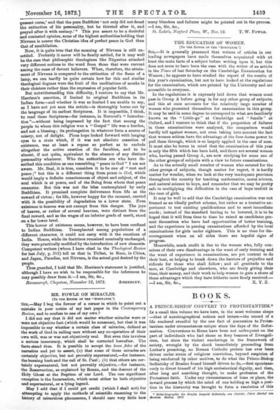MR. FOWLE ON MIRACLES.
(TO THE EDITOR 011 TAB "SPECTATOR.')
.SIR,—May I beg the favour of a corner in which to point out a mistake in your notice of my last paper in the Contemporary Review, and to confess to one of my own ?
I did not say that it did not matter whether miracles were or were not objective fact (which would be nonsense), but that it was impossible to say whether a certain class of miracles, defined as the work of God in calling men without any co-operation of their own will, was or was not objectively real. But even this involves a serious inaccuracy, which shall be corrected hereafter. The facts stand thus. It is possible to accept the bona fides of the narrative and yet to assert, (a) that some of these miracles are certainly objective, but not provably supernatural,—for instance, the burning bush and the call of St. Paul ; (b) that others are cer- tainly supernatural, but not provably objective,—for instance, -the Resurrection, as explained by Renan, and the descent of the Holy Ghost at the Baptism of our Lord. The one significant 'exception is the Incarnation, which must either be both objective and supernatural, or a lying legend.
May I add that if I could get credit (which I shall not) for attempting to apply the methods of scientific reasoning to the history of miraculous phenomena, I should care very little how many blunders and failures might be pointed out in the process, —I am, Sir, &c.,
St. Luke's, Nutford Place, TV., Nov. 12. T. W. FOWLE.


































 Previous page
Previous page